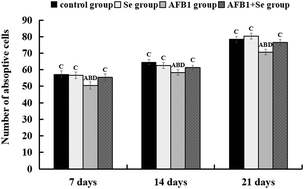Ameliorative effects of selenium on the excess apoptosis of the jejunum caused by AFB1 through death receptor and endoplasmic reticulum pathways
Abstract
Aflatoxin B1 (AFB1), one of most potent and common mycotoxins in human food and animal feed, has hepatotoxic and carcinogenic effects on humans and poultry. Recent studies indicated that selenium (Se) has a protective effect on apoptosis induced by toxin poisoning. The present study was designed to reveal the ameliorative effects of selenium on the expression of apoptosis related molecules in the jejunum of broilers exposed to an AFB1 diet for 3 weeks. A total of 216 one-day-old healthy Cobb broilers were randomly divided into the control group (0 mg kg−1 AFB1), AFB1 group (0.6 mg kg−1 AFB1), AFB1 + Se group (0.6 mg kg−1 AFB1 + 0.4 mg kg−1 supplement Se) and Se group (0.4 mg kg−1 supplement Se), respectively. TUNEL and flow cytometry assays both indicated that 0.4 mg kg−1 selenium could ameliorate excess apoptosis caused by AFB1 in jejunal cells. Moreover, the expressions of FAS, FASL, TNF-α, TNF-R1, CASPASE-3, CASPASE-8, CASPASE-10, GRP78 and GRP94 analyzed by qRT-PCR demonstrated that 0.4 mg kg−1 selenium restored these parameters to be close to those in the control group. In summary, supplementation of selenium at a concentration of 0.4 mg kg−1 selenium could protect the chicken's jejunum from excess apoptosis caused by 0.6 mg kg−1 AFB1 through down-regulating the expression of death receptor pathway and endoplasmic reticulum pathway related molecules. According to this conclusion, this study may contribute to a better understanding of selenium's protective role against AFB1 poisoning.



 Please wait while we load your content...
Please wait while we load your content...